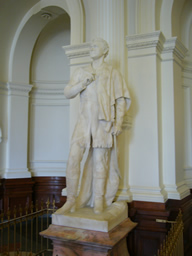 Well, last weekend (September 1-4) was a long weekend because Monday was Labor day (yes, American spelling on purpose). So I very carefully planned a trip away from Dallas to spend some time in Austin, the capital city of Texas. Austin is named after a man called Stephen F. Austin. He led a very interesting life and played a pivotal role in the development of Texas as its own country and ultimately as a part of the United States. I didn’t know this before, but Texas is the only state that can claim to have been a country once in its own right.
Well, last weekend (September 1-4) was a long weekend because Monday was Labor day (yes, American spelling on purpose). So I very carefully planned a trip away from Dallas to spend some time in Austin, the capital city of Texas. Austin is named after a man called Stephen F. Austin. He led a very interesting life and played a pivotal role in the development of Texas as its own country and ultimately as a part of the United States. I didn’t know this before, but Texas is the only state that can claim to have been a country once in its own right.
You see, Texas has been a part of 6 countries in its time. These are known as the six flags over Texas. In the state Capitol (pictured above) which I was lucky enough to visit, they have a large star on the floor in the centre of the building which depicts the emblems of those 6 countries.
These countries are also shown on the font of the building. I managed to get a shot of them below. They are chronological from left to right: Spain, France, Mexico, Republic of Texas, the Confederacy and the Unites States.

Between 1690 and 1821, Texas as a part of the “New Spain” colony, governed by Spain. During the war of the Quadruple Alliance, France captured the capital for a brief time but gave it back up to Spain. In 1821, Mexico became independent from the mother country and so from 1821 to 1835 Texas was a part of Mexico.
 Then things get really interesting. In 1820, the young Stephen Austin’s father (Moses Austin) applied to Spain for a grant to allow for around 300 US families to settle in Texas. In 1821, Moses died, leaving the grant to Stephen. Because of the depression in the US, Austin had no trouble coming up with the 300 families. Unfortunately, this coincided with the Mexican revolution and its subsequent independence.
Then things get really interesting. In 1820, the young Stephen Austin’s father (Moses Austin) applied to Spain for a grant to allow for around 300 US families to settle in Texas. In 1821, Moses died, leaving the grant to Stephen. Because of the depression in the US, Austin had no trouble coming up with the 300 families. Unfortunately, this coincided with the Mexican revolution and its subsequent independence.
Texas (or rather, I should call it “Tejas”) was now a part of the state “Coahuila y Tejas” which was one of the constituents of the new “United Mexican States”. Austin had to re-negotiate the grant, which he managed to do by 1823. The new grant to Austin had quite a few restrictions on it, including the fact that immigrants had to adopt Spanish names, become Catholic and free their slaves.
You see, the immigrants were mostly from the South and many brought their slaves with them, they also tended to be Protestant. This caused a great deal of tension for the settlers and many of them brought their slaves in anyway. They were the free thinking sort, not to be bullied around by central government. Austin had civil and military control over the settlers anbetween 1825 to 1829, had plans to bring in over 900 more.
In 1832, the people of Texas made a list of resolutions they wanted passed by the Mexican government. Among other things, they wanted separation from Coahuila and a better postal service. Austin went to visit Mexico in 1833 with this list, on the way back from Mexico he was arrested for starting an insurrection. He was only able to return to Texas in 1835, when he was made the commander of the “Volunteer army of the people”.
 Texas quickly escalated into a revolution situation, with the famous battle of the Alamo occurring in March
Texas quickly escalated into a revolution situation, with the famous battle of the Alamo occurring in March 1986 1836, a battle which marked the end of a 13 day seige in which Davy Crockett (among others) was killed. The following month, in The Battle of San Jacinto, Sam Houston secured victory for Texas and, ultimately, her independence from Mexico.
Sam Houston’s marble statue is shown here on the right, sitting grandly aside Austin’s in the capitol itself. He became the first (and only) president of the Republic of Texas, sitting in office for 2 terms after which he became the governor of Texas, when it became a part of the United States. He also had a city named after him.
Austin himself had to settle for secretary of state but died in December, 1836 of severe Pneumonia. On hearing of his death, Houston declared: “The father of Texas is no more, the first pioneer of the Wilderness has departed”. He lived long enough to see Texas become its own country and he will always be remembered fondly by the people who call this place home.